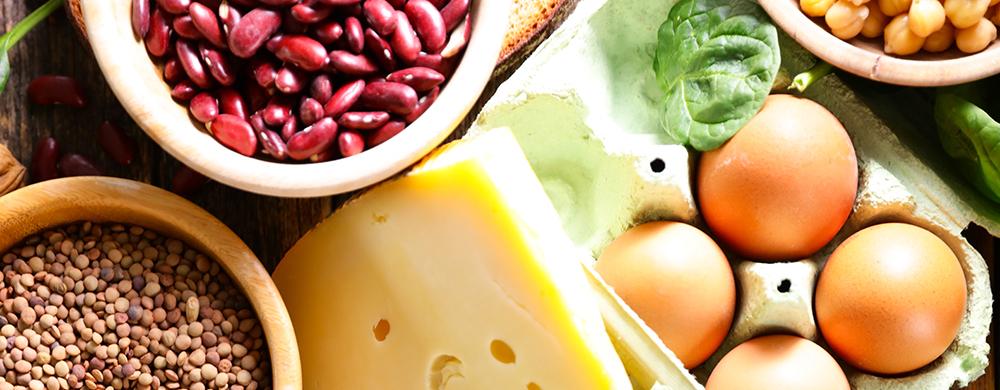As a society we know we need to eat less meat, but our bodies also need protein. In our latest blog post we look at how much protein our bodies need and why, as well as some alternative protein sources for a balanced diet.
Why do we need protein?
We need protein to build, maintain and repair our muscles, bones, skin, tissues and cells. Proteins are essential for many of the chemical reactions that take place in the body, for example digestion of food. Protein itself can also be broken down and used as an energy source. Our bodies are made up of around 15% protein. Depending on your weight that is around 10kg.
The recommended intake for adults is 0.75g protein per kg body weight per day. For example, if you weigh 75kg (average weight for a man) you need 56g/day and if you weigh 60kg (average weight for a woman) you need 45g/day. An extra 6g/day is required during pregnancy, an extra 11g/day breastfeeding a baby under 6 months and an extra 8g/day breastfeeding a baby over 6 months (information from the British Nutrition Foundation)
Most people in the UK eat more than enough protein. This isn’t necessarily a problem in itself, but some of the main sources of protein in the typical Western diet are not good for us if eaten in large quantities. 34% of our intake comes from meat products and 13% from dairy. (from the National Diet and Nutrition Survey).
Good sources of protein
Meat and dairy products can be high in saturated fat which can increase your risk of heart disease and stroke. Red and processed meats increase the risk of developing colon cancer. Meat and dairy production can also have a negative impact on the environment.
There other sources of protein that are better for your health and better for the environment. It’s always good to eat as big a variety of foods as possible, because then you are getting a good mix of lots of different nutrients.
Fish is an excellent source of protein and is better for you then red meat. White fish is lower in fat than meat and contains beneficial vitamins and minerals and some omega-3. Oily fish is rich in omega 3 which may help to prevent heart disease. It is recommended that adults eat at least two portions of fish a week, one of which should be oily. Shellfish is also low in fat and a good source of minerals. When buying fish and shellfish try to find products labelled as ‘sustainably sourced’ as this is better for the environment.
There are many sources of plant-based protein such as seeds, beans, pulses, tofu and nuts. Seeds, beans, pulses and nuts are a good source of fibre as well as protein. As mentioned in my previous post on fibre, most people in the UK are falling well short of their recommended daily fibre intake. Beans and pulses are low in fat, very filling and cheap to buy. You could try substituting some of the meat in recipes for lentils or beans to make it lower fat and more economical. As a general rule, plant-based sources of protein have less negative impact on the environment than meat and dairy products.
The Vegan Society factsheet on protein has some examples of the protein content of different types of plant-based food.
Insects as a source of protein
If you’re feeling particularly adventurous there is another low-fat, high-protein, environmentally sustainable food to try – insects! Insects are commonly eaten in many other countries and until recently were available in the UK from various websites and even supermarkets. Due to changes in regulations related to Brexit you cannot currently buy insects to eat, but traders hope they will be available again in 2023. According to Horizon Edible Insects they are a good source of calcium, iron, zinc and B12 as well as protein, and have a “ nutty to earthy flavour.” Bon appetit!
Meat-free recipes
If you'd like to add some alternative sources of protein to your diet but don't know where to start, try one of the easy, budget-friendly recipes below, shared with thanks to the Vegan Recipe Club.
One pot cheesy bean enchiladas
Author

Dr Susi Jennings - Senior Lecturer and Unit Leader- BSC (Hons.) Nutrition with Professional Practice.

